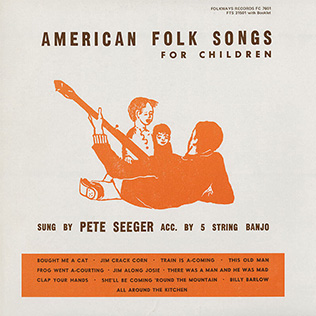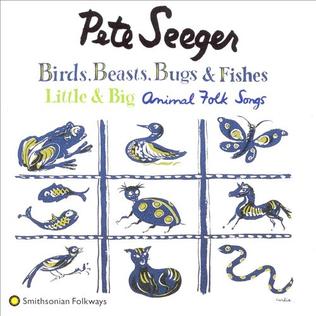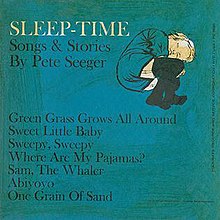
Peter Seeger was an American folk singer and social activist.

Guy Hughes Carawan Jr. was an American folk musician and musicologist. He served as music director and song leader for the Highlander Research and Education Center in New Market, Tennessee.

"The Lion Sleeps Tonight" is a song originally written and recorded by Solomon Linda under the title "Mbube" for the South African Gallo Record Company in 1939. Linda's original was written in Zulu, while the English version's lyrics were written by George David Weiss. The song was adapted and covered internationally by many pop and folk revival artists in the 1950s and 1960s, especially after it was published by Folkways Music Publishers in December 1951, including Henri Salvador, the Weavers, Jimmy Dorsey, Yma Sumac, Noro Morales, Miriam Makeba, and the Kingston Trio. In 1961, it became a number one hit in the United States as adapted in English with the best-known version by the doo-wop group the Tokens. It went on to earn millions in royalties from cover versions and film licensing. The pop group Tight Fit had a number one hit in the UK with the song in 1982. This song is written and composed in the key of F major.
Children's music or kids' music is music composed and performed for children. In European-influenced contexts this means music, usually songs, written specifically for a juvenile audience. The composers are usually adults. Children's music has historically held both entertainment and educational functions. Children's music is often designed to provide an entertaining means of teaching children about their culture, other cultures, good behavior, facts and skills. Many are folk songs, but there is a whole genre of educational music that has become increasingly popular.

Margaret "Peggy" Seeger is an American folksinger. She has lived in Britain for more than 60 years, and was married to the singer and songwriter Ewan MacColl until his death in 1989.

Mike Seeger was an American folk musician and folklorist. He was a distinctive singer and an accomplished musician who played autoharp, banjo, fiddle, dulcimer, guitar, mouth harp, mandolin, dobro, jaw harp, and pan pipes. Seeger, a half-brother of Pete Seeger, produced more than 30 documentary recordings, and performed in more than 40 other recordings. He desired to make known the caretakers of culture that inspired and taught him.

Elizabeth "Libba" Cotten was an American blues and folk musician, singer, and songwriter.
Smithsonian Folkways is the nonprofit record label of the Smithsonian Institution. It is a part of the Smithsonian's Smithsonian Center for Folklife and Cultural Heritage, located at Capital Gallery in downtown Washington, D.C. The label was founded in 1987 after the family of Moses Asch, founder of Folkways Records, donated the entire Folkways Records label to the Smithsonian. The donation was made on the condition that the Institution continue Asch's policy that each of the more than 2,000 albums of Folkways Records remain in print forever, regardless of sales. Since then, the label has expanded on Asch's vision of documenting the sounds of the world, adding six other record labels to the collection, as well as releasing over 300 new recordings. Some well-known artists have contributed to the Smithsonian Folkways collection, including Pete Seeger, Ella Jenkins, Woody Guthrie, and Lead Belly. Famous songs include "This Land Is Your Land", "Goodnight, Irene", and "Midnight Special." Due to the unique nature of its recordings, which include an extensive collection of traditional American music, children's music, and international music, Smithsonian Folkways has become an important collection to the musical community, especially to ethnomusicologists, who utilize the recordings of "people's music" from all over the world.

"Where Have All the Flowers Gone?" is a modern folk-style song. The melody and the first three verses were written by Pete Seeger in 1955 and published in Sing Out! magazine. Additional verses were added in May 1960 by Joe Hickerson, who turned it into a circular song. Its rhetorical "where?" and meditation on death place the song in the ubi sunt tradition. In 2010, the New Statesman listed it as one of the "Top 20 Political Songs".

The American folk music revival began during the 1940s and peaked in popularity in the mid-1960s. Its roots went earlier, and performers like Josh White, Burl Ives, Woody Guthrie, Lead Belly, Big Bill Broonzy, Billie Holiday, Richard Dyer-Bennet, Oscar Brand, Jean Ritchie, John Jacob Niles, Susan Reed, Paul Robeson, Bessie Smith, Ma Rainey and Cisco Houston had enjoyed a limited general popularity in the 1930s and 1940s. The revival brought forward styles of American folk music that had in earlier times contributed to the development of country and western, blues, jazz, and rock and roll music.
"Worried Man Blues" is a folk song in the roots music repertoire. It is catalogued as Roud Folk Song Index No. 4753. Like many folk songs passed by oral tradition, the lyrics vary from version to version, but generally all contain the chorus "It takes a worried man to sing a worried song/It takes a worried man to sing a worried song/I'm worried now, but I won't be worried long." The verses tell the story of a man imprisoned for unknown reasons "I went across the river, and I lay down to sleep/When I woke up, had shackles on my feet", who pines for his lost love, who is "on the train and gone." The melody in 4/4 timing has a strong resemblance to "The Battle Hymn of the Republic", which is in 6/8 timing.
"The Bells of Rhymney" is a song first recorded by folk singer Pete Seeger, which consists of Seeger's own music accompanying words written by Welsh poet Idris Davies.
Folkways Records was a record label founded by Moses Asch that documented folk, world, and children's music. It was acquired by the Smithsonian Institution in 1987 and is now part of Smithsonian Folkways.

"Pittsburgh Town", sometimes titled as "Pittsburgh" or "Pittsburgh is a Great Old Town", is a folk song written by Woody Guthrie and originally recorded by Pete Seeger. The song was written during a Pittsburgh, Pennsylvania stop on an Almanac Singers' tour; both Seeger and Guthrie were members of the band at this time. The song speaks of the labor and environmental problems that the city was facing in 1941, when the song was written. In the time since, environmental legislation has reduced the pollution problem that plagued Pittsburgh; because of this, the song's mentions of pollution in Pittsburgh have been sometimes been replaced with verses extolling the city.

The discography of Pete Seeger, an American folk singer, consists of 52 studio albums, 23 compilation albums, 22 live albums, and 31 singles. Seeger's musical career started in 1940 when he joined The Almanac Singers. He stayed with the group for two years until he was drafted into the Army to fight in the Second World War. After the end of World War II in 1945, Seeger helped found an organization known as People's Songs, along with the influential folk music magazine People's Songs Bulletin. He published several singles and a studio album with the magazine. Seeger would play at People's Songs events, called hootenannies, until the organization folded in 1949. After People's Songs, Seeger and another former member of the Almanacs, Lee Hays, founded the Weavers, who achieved commercial success. In 1952, The Weavers went on hiatus due to the Red Scare; Seeger and Hays both had Communist ties. After the demise of the Weavers, Seeger released a solo album, American Folk Songs for Children, in 1953 on Folkways Records. He continued to release albums on Folkways until he was signed to Capitol in 1961.

American Folk Songs for Children is a studio album released by Pete Seeger in 1953 by Folkways Records. It was Seeger's first solo album.
Jeff Place is the Grammy-award-winning Archivist and Curator at the Smithsonian Center for Folklife and Cultural Heritage. He and Anthony Seeger were the first two full-time employees hired in 1987 when the Smithsonian acquired Folkways Records from the estate of Folkways founder Moses Asch.

Birds, Beasts, Bugs & Fishes is a 1998 compilation album by Pete Seeger and was released on Smithsonian Folkways as SFW45039.

American Industrial Ballads is a studio album by American folk singer Pete Seeger. It was released in 1956 by Folkways Records. It was reissued in 1992 by Smithsonian Folkways.

Gazette, Vol. 1 is a studio album by American folk singer Pete Seeger. It was released in 1958 by Folkways Records. It was later re-released by Smithsonian Folkways. The album artwork is by Antonio Frasconi and the design by Ronald Clyne.














